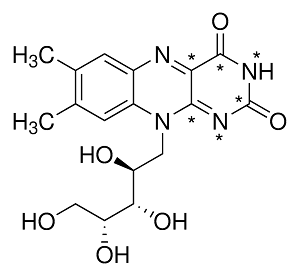HI! I’M ELEMENT AI.
Vitamin B2

Product Description
Vitamin B2, also known as riboflavin, is a water-soluble vitamin that plays a crucial role in various physiological processes in the human body.
Product:
Vitamin B2
CAS:
83-88-5
Synonym:
Riboflavin; Lactoflavin; Vitamin G
Structure:

Typical Characteristics
Appearance
Yellow to orange-yellow crystalline powder
Density
1.65 g/cm3
Melting point
280 °C (decomposes)
Molecular Weight
376.36
Odor
Slight odor
Purity
≥98%
Refractive index
1.733
Uses, Applications & Markets
Key applications
get a quote



Vitamin B2 used in many
industry applications
Vitamin B2, also known as riboflavin, is a water-soluble vitamin that plays a crucial role in various physiological processes in the human body. Here are some of its industrial applications:
- Food Additive: Riboflavin is commonly used as a food additive in the food industry to fortify and enrich a wide range of food products. It is added to processed foods, beverages, dairy products, cereals, and nutritional supplements to increase their nutritional value.
- Colorant: Riboflavin is used as a natural yellow-orange food coloring agent in various food products, including dairy products, beverages, baked goods, and confectionery items. It provides a bright and appealing color to the products without altering their taste or odor.
- Animal Feed: Riboflavin is included in animal feed formulations for livestock, poultry, and aquaculture to ensure optimal growth, development, and overall health. It helps prevent riboflavin deficiency in animals and supports various metabolic functions.
- Pharmaceuticals: Riboflavin is used in the pharmaceutical industry as an active ingredient in various medications, supplements, and vitamin formulations. It is available in oral tablets, capsules, and liquid forms for the treatment and prevention of riboflavin deficiency and related health conditions.
- Cosmetics and Personal Care: Riboflavin is incorporated into cosmetic and personal care products, such as skin creams, lotions, shampoos, and hair conditioners, for its potential benefits to skin and hair health. It may help improve skin texture, promote wound healing, and enhance hair strength and shine.
- Industrial Processes: Riboflavin is utilized in certain industrial processes, such as fermentation and biotechnology, as a nutrient source for microorganisms and cell cultures. It serves as a growth factor for various microorganisms used in the production of enzymes, antibiotics, and other bioproducts.
- Photography: Riboflavin has historical significance in photography as a photosensitizer and light-sensitive compound. It was used in early photographic processes, such as black-and-white film development and printing, to capture and reproduce images.
- Research and Development: Riboflavin is employed in scientific research and development activities, including biochemical studies, diagnostic assays, and cell culture experiments. It serves as a valuable tool for investigating cellular metabolism, enzyme kinetics, and metabolic pathways.